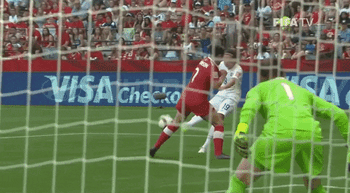🧼 What is sportswashing?
Sportswashing is when an individual, group, organization or nation uses sport to improve its reputation and/or public image. Because sports are generally considered apolitical (spoiler alert: this is false), they have the ability to be exploited to boost one’s image.
- And there are many ways it can be done, including purchasing a sports team, hosting an event and/or league and sponsoring athletes and teams.
While the official term was coined in 2015, the practice of sportswashing is not new. One high-profile example? The 1936 Berlin Olympics — commonly referred to as the Nazi Olympics.
- Adolf Hitler utilized the platform to spread Nazi propaganda, but notably took down signs banning Jews from public places, camouflaging explicit anti-Semitism while still reaffirming his “Aryan race” theory through signage, magazines and more.
- German athletes topped the medal table, and, despite some nations threatening to protest, journalists praised the Games for allowing Germany “back in the fold” and making them “more human again.” Sportswashing at its finest.
⛳️ Golf enters the chat
Sportswashing is once again making headlines thanks to the lastest from the aforementioned LIV Golf. The controversy centers on the upstart golf league’s funding source — Saudi Arabia’s Public Investment Fund, which the nation has already used to spend at least $1.5 billion on other sportswashing initiatives (Formula One, soccer and more).
- And the athletes are well aware of the situation. In former PGA star and current face of LIV Golf Phil Mickelson’s now-infamous comments about the rival league, the six-time major winner acknowledged Saudi Arabia’s human rights abuses, but doubled down on his decision.
“We know they killed (reporter Jamal) Khashoggi,” Mickelson said referencing the Saudi-sanctioned murder of the Washington Post journalist. “They execute people over there for being gay. Knowing all of this, why would I even consider this? Because this is a once-in-a-lifetime opportunity to reshape how the PGA Tour operates.”
- Essentially, if the money is right, the atrocities will be overlooked by some, which is what those who engage in sportswashing are banking on…pun intended.
🙅♀️ Hostess with the least-est
Beyond LIV Golf and Saudi Arabia, many countries with murky human rights records have hosted major sporting events in an effort to improve their reputations, and there’s yet another example taking place right now: F1’s Azerbaijan Grand Prix.
- The nation — located at the boundary of Eastern Europe and Western Asia — has hosted the event since 2017 in an attempt to increase its global visibility — and deflect from government corruption and jailing of dissidents.
And the bigger the tournament, the better for sports washers. Russia hosted two of the world’s biggest sporting events in recent years — the 2014 Winter Olympics in Sochi and the 2018 men’s FIFA World Cup.
- The country spent around $60 billion to host both events as part of President Vladimir Putin’s efforts to divert domestic and international attention away from the country’s human rights abuses.
On a related note, countries who sportswash frequently make sports less of a safe space. In 2019, Azerbaijan’s longstanding conflict with neighbor Armenia resulted in Armenian soccer player Henrikh Mkhitaryan skipping the 2019 UEFA Europa League final, citing safety concerns.
- Two years later, pride flags were confiscated from fans who traveled to Azerbaijan for the men’s European Championship. Not okay.
🌎 Olympic-level sportswashing
There’s perhaps no greater stage for sportwashing than the Olympic Games. Despite the International Olympic Committee’s (IOC) insistence that politics and the Games shouldn’t mix, the organization has a lengthy history of allowing countries to buy use the event for geopolitical gain.
- As noted earlier, one of the earliest examples of sportswashing came during the 1936 Summer Olympics in Nazi Germany, and the Games have been littered with additional examples ever since.
Look no further than this year’s Winter Games in Beijing. While China isn’t a lesser-known country trying to introduce itself to a global audience, its government was attempting to clean up its image in the midst of inhumane treatment of the country’s Uyghur Muslim population.
- The Olympics also took place soon after the censorship and subsequent disappearance of Chinese tennis player Peng Shuai, who accused a former Chinese vice premier of sexual assault.
- The IOC didn’t just skirt over the topic — they used Peng’s reemergence to public life at the event as part of China’s cover-up during the Games. Their influence in Peng’s story still continues to this day.
➡�️ What’s next?
2022 might be sportswashing’s biggest year, culminating with November’s men’s FIFA World Cup. FIFA awarded Qatar hosting rights in 2010 after the country’s bidders allegedly bribed voters. The Asian nation (that’s notably the size of Connecticut) had almost no infrastructure to host the event at the time, needing every moment of the 12-year lead-up to make it happen.
- The entire construction project was completed by underpaid migrant workers whom Amnesty International estimates are still owed $440 million in compensation for labor abuses.
- The laborers endured horrifying conditions, frequently forced to work long hours in the sun without breaks or water. As of last year, more than 6.5K workers have died in Qatar since the World Cup was awarded. Horrendous.
Somewhat unsurprisingly, FIFA has avoided the issue entirely in the buildup to the tournament, despite calls from human rights groups, players and fans. It’s unfortunately standard practice for sports organizations to turn the other cheek, especially when big dollars are on the line.
- The practice of sportswashing is only becoming more pervasive, even touching the women’s sports space. With more major events ahead, we can only hope that increased awareness leads to real change.
Enjoying this article? Want more?

Sign up for The GIST and receive the latest sports news straight to your inbox three times a week.

